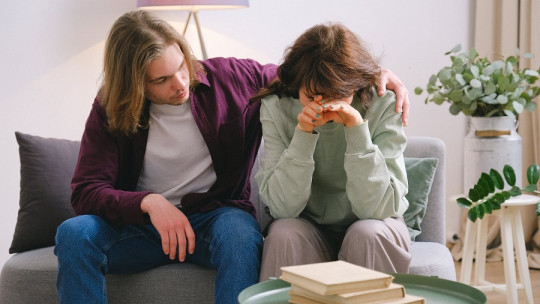
The death of a loved one is a process as bitter and sad as it is natural, since it is part of the lives of practically all people. Therefore, the emotional pain it generates is not in itself a psychopathology, although this experience tests our ability to manage our own feelings.
And in fact, in some cases a psychological alteration does arise that can be considered a disorder: it is complicated grief, which occurs when we are not able to overcome the loss for a very long period, or when it affects us in a way. so intense that it significantly damages our health.
Given this reality, it is important to know some Effective strategies to help you cope with the death of a loved one ; Let’s see the most important ones.
Keys to facing the death of a loved one
When someone very close to us dies it seems as if the world stops; and in many ways, we must “learn” to live in a world in which that person is no longer there. This implies being able to let go of that past that will no longer return and that from the moment of that person’s death will become real only in the form of memories.

Since not all human beings are the same nor do we face difficult moments in life in the same way, below we briefly offer a series of general tips that we can apply daily to successfully face the death of a loved one, and that They must be adapted to the characteristics and needs of each one.
It is a set of guidelines, guidelines or strategies that can help us move as fluidly as possible through this painful experience, without participating in dynamics of emotional self-sabotage.
1. Try to talk about the topic
Instead of hiding what happened and not communicating to anyone what we think or feel, when faced with the death of a loved one, we should talk about what happened, with friends or family who may be affected just as we are or with anyone else.
Some people tend to stay silent without communicating what is going through their heads in the face of a sudden loss, which tends to further complicate the possibilities of successfully coming out of the grief they are going through and gives rise to a taboo. This taboo makes the process of overcoming the loss more complicated, because it leads us to try to live as if that death had not occurred, exposing us to situations of emotional vulnerability when it becomes clear that this desire does not correspond to reality.
Furthermore, putting our discomfort into words It helps us see the situation more neutrally, to perceive it as it is without subtracting or adding importance to it, and without being afraid of those kinds of thoughts, something key to turning the page. Communicating our own feelings also has a therapeutic effect that will make us feel better in the long term and will allow us to begin to overcome the grief we are going through.
We must avoid at all costs closing ourselves in and encourage ourselves to talk about the death that has stalked us both on a family and friendship level, something that will provide us with therapeutic relief.
2. Accept what you feel
Facing the death of someone we love involves accepting what we feel and feeling as our own all the pain that overwhelms us in these difficult moments. That is we must renounce any attempt to “block” ideas, thoughts or mental images.
Accepting one’s feelings consists of not trying to repress any of our mental contents (something that is impossible to do effectively anyway) and bringing them out.
3. Help others who are in the same situation
An unexpected death of someone who was important to us usually has a great painful impact on many other people, in addition to ourselves.
It is in these cases when we must provide the help and emotional support that other people who may be having the same or worse time than us in these circumstances may need.
Helping friends, family or other people who may be going through a moment of pain or suffering will also allow us to feel better about ourselves, knowing that we are doing a good deed for others and converting our emotional involvement in grief, on the one hand, into tasks of supporting people we care about, on the other.
4. Participate in ceremonies
Participating in religious or civil ceremonies celebrated for the death of a loved one will also help us greatly on a psychological level and will allow us to say goodbye to our loved one.
These types of ceremonies, which can be both memorials and funerals, have both the function of saying goodbye to the deceased person and of remembering them and making us feel better by symbolizing the end of one cycle of our life and the beginning of another. This helps us change our mentality and accept that that stage is over.
Likewise, there are many activities that we can carry out personally to remember the recently deceased person, such as planting a tree, reading a particularly significant passage from a book or keeping a promise made to that person.
5. Keep some memories
Preserving memories of the deceased person, whatever type they may be, will help us to always keep our loved one in mind and obtain the happiness of their memory in the most difficult moments of grief. It’s a way of integrate memories about that loved one into our daily lives, without necessarily linking them to the pain of loss. Now, these memories must be scarce, since if we try to keep all of his belongings, we will actually be participating in the illusion that that person is still alive.
To preserve memories, it is common to set up a box or chest with photographs or belongings of the deceased person.
6. Avoid isolation
Some people tend, when faced with the recent death of a loved one, to isolate themselves socially and seclude themselves in their homes for a time due to the intense pain they feel daily.
This is one of the worst strategies that can be put into practice to overcome grief over the death of someone important to you, since it only creates more pain and suffering by predisposing you to focus your attention on those painful memories, without being able to integrate them into a mentally healthy lifestyle.
Instead of isolating or secluding ourselves, it is necessary to leave the house frequently, do different activities that can distract us from the pain felt, and maintain contact with other people as we can during the day.
7. Take care of yourself physically
After a situation of unforeseen death, many people They tend to neglect their most basic care and they can lose weight drastically or become ill in one way or another. The lack of hygiene or healthy habits will not only lead to physical problems, but also mental problems due to the general discomfort and low self-esteem that this gives rise to.
8. Ask for support
If the situation completely overwhelms you, it is best to go to psychotherapy.
A qualified psychology professional will provide you with all kinds of practical emotional management strategies and guidelines to overcome grief.
In this sense, if you are interested in starting a psychotherapy process, contact us; in Cribecca Psychology we will be happy to help you.








